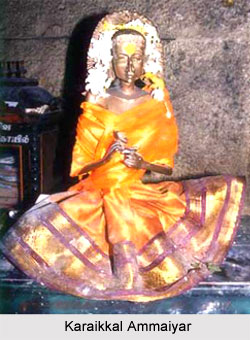 Karaikkal Ammaiyar was one of the 3 women among the total 63 Nayanmars (Shaivite devotees). Karaikkal Ammaiyar, meaning the revered mother from Karaikkal, is considered as one of the greatest figures of ancient Tamil literature. Karaikkal Ammaiyar was a Shaiva poet and a devotee of Lord Shiva. She has composed mainly 3 major poetic works, namely Irattaimanimalai, Arputattiruvantati and Muttatiruppatikankal. These devotional verses are considered amongst the earliest extant Shaivite poems. The poems of Karaikkal Ammaiyar are renowned for their expression of connection to God and philosophical content.
Karaikkal Ammaiyar was one of the 3 women among the total 63 Nayanmars (Shaivite devotees). Karaikkal Ammaiyar, meaning the revered mother from Karaikkal, is considered as one of the greatest figures of ancient Tamil literature. Karaikkal Ammaiyar was a Shaiva poet and a devotee of Lord Shiva. She has composed mainly 3 major poetic works, namely Irattaimanimalai, Arputattiruvantati and Muttatiruppatikankal. These devotional verses are considered amongst the earliest extant Shaivite poems. The poems of Karaikkal Ammaiyar are renowned for their expression of connection to God and philosophical content.
Early Life of Karaikkal Ammaiyar
She was born as Punithavati at Karaikkal, a maritime trading region in Chola Nadu, during the 6th century. Her father was a merchant named Danathathan. Since her childhood, Karaikkal Ammaiyar was raised in a religious environment and diligently venerated Lord Shiva. She chanted the five letter mantra Namashivaya and focused on the needs of Shaivite devotees. She was married to Paramathathan, who was the son of a wealthy merchant from Nagapattinam. Even after her wedding, Karaikkal Ammaiyar sustained her preferred religious life. She generously fed and gave clothes and jewels to Shaiva devotees who visited her house.
Legends Related to Karaikkal Ammaiyar
According to legends, one day a hungry Shaivite devotee came to her home, but as lunch was still not ready, Karaikkal Ammaiyar presented the devotee with a mango that her husband Paramathathan had brought for himself earlier. Later when Paramathathan returned home, Karaikkal Ammaiyar served him the only one mango that was left. As the mango was very scrumptious, he husband requested his wife to serve the other mango. Ammaiyar prayed to Lord Shiva for help and a mango materialized in her hand, which she gave to her husband. This mango was divinely sweet and infinitely delectable as compared to the first one. Paramathathan questioned as to how she acquired this fruit.
When his wife revealed that she got the divine fruit by praying to Lord Shiva, Paramathathan did not believe it and asked her to generate another mango with divine help. She requested Lord Shiva and by God`s grace another similar mango appeared, which Karaikkal Ammaiyar gave to her spouse. But then the mango vanished and Paramathathan comprehended the heavenly nature of his wife and his arrogance. He realized that his wife was worthy of worship and he did not deserve her. Thus he left his wife and later got married to the daughter of a merchant. His new wife gave birth to a girl child whom Paramathathan named Punithavati, after his first wife.
Hearing this, Karaikkal Ammaiyar`s family took her to Paramathathan. His former husband addressed her respectfully and stated that he knew she was not a normal human being and had divine powers. Disappointed with her husband`s thinking, she roamed from one temple to another praising Lord Siva and ultimately reached the shrine at Tiruvalangadu. She prayed to Lord Shiva and requested for a boon that she may reverence Lord Shiva as an ethereal apparition. The legend mentions that Karaikkal Ammaiyar received the blessing and eventually left her physical body and travelled to Mount Kailash and climbed it upside down on her head.
Prayers are offered to Karaikkal Ammaiyar even now at the Tiruvalangadu temple, near Chennai (formerly known as Madras). In her honour, a festival is also celebrated at the temple.













